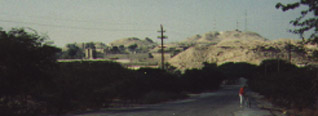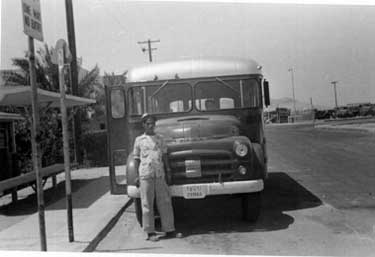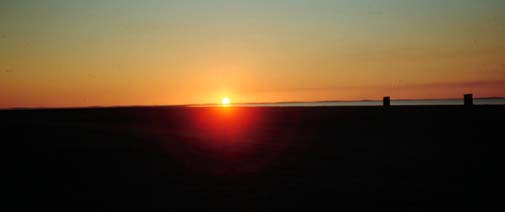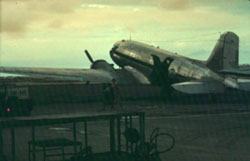|
In 1949, there were fewer than 100 children in the Dhahran Senior Staff School; it was actually in the low nineties, kindergarten through ninth
grade. There were fewer students at Ras Tanura and Abqaiq. The
school was on the trimester schedule and we followed the New York
State Regent's curriculum. We went to school January, February,
and March with April off. The thinking was that students on home
leave could catch up during the trimester respite. Half day classes
in April, August, and December were scheduled for students needing
to brush up after home leave. It was a wonderful system and most
of us received a good education; the sciences were lacking because
there was no laboratory set up. Still, the teachers did well to
improvise and ARAMCO stepped forth with just about every service
imaginable to support the school’s mission. I remember Frank O'Conner, Bill Fischer, Ms. Rose, Ms. Magnus, Mr. Davidson, Mr. Collins, Ms. Raleigh, Ms. Lynch, Ms. Sealey, and the superintendent Mr. James, as though it was yesterday. I still use life-long skills that
they taught me.
When Dhahran was very small, a camp without a fence, the people
knew each other intimately. Dhahran was barely more than an outpost.
The camp had started before World War II, but when things got
too hot, ARAMCO sent everyone home. In 1944, some of the original
workers and new hires began to filter back as ARAMCO pumped millions
of dollars into the plant, drilling, and export process. By 1945,
families and children began to appear. Pinky Alexander and Stevie Furman were two of the first children. I think Patty Dale came early too. My Dad came in one of the 1944 groups; his badge
number was 159. When I went to work for ARAMCO in 1982, my number
was 193014. Steve Furman helped me get that job.
The old guard of those first years felt as though the company
was theirs and this created some problems as ARAMCO grew from
a few hundred employees. Some were pushed aside and others were
just replaced as ‘new’ talent streamed into the field, as they
called the operations area. People from California with company
connections did not necessarily agree with those who may have
come from Oklahoma, Texas, Louisiana, or New York. This was the
beginning of one layer of company politics. |
|
|
|
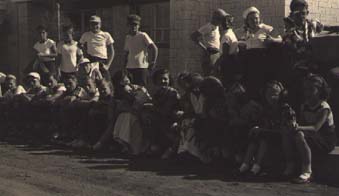 |
|
Waiting
for the bus. I don't remember the occasion,
but we were outside the school . Can you pick out R. Hardy,
D. Biggins, M. Erlenmeyer, T. Sutherlin, W.
Brown, M. Furman, P.Schmidtbauer, D. Coleman,
D. White, L. Killian, C.Hennig, G. Russell,
G. Sanders, E. Ford, D. McWood, B. Callaway,
L. McCarthy, N. Schaffer, M.P. Singelyn, S.
McMullen, and Steve Furman? There are a few others too.
c.1951 (anon) |
|
|
|
Your friends were everything to you. Dick Palmer, Billy Brown,
Stevie Furman, Norm Gray, Malcolm MacKenzie, Henry Dorsey, Terry Sutherlin,
Linda Lee Killian, Bob Hardy, Dick Wilbanks, Ronny Graham, Linda Hawkey,
Barbara Lucher, Linda Jane McCarthy, Betsy Ford, Mary Covell, Diane McWood,
Gladys McWood, Mary Pat Singelyn, Mike Ross, Ann Howley, Tori Collins,
Denny Goodman, Mike Henry, Tomi Harris,Tex Booker,
Diane Renfer, Billy and Bobby Hathaway, Ken Groat, Tom Eggink
and others formed priceless relationships onto which the author's
memories knitted and now endure. It was a network of survival, for we
came from so many different walks of life and so many different places;
we might not have sought one another out if we were back home.
Children knew from the beginning that if they made a big enough
mistake, dad would get the ax or be transferred. Most of us stayed
within the ‘good’ envelope, but from time to time children were
instrumental in their parents' farewell. One child accidentally
set a fire which destroyed a housing unit. They departed. And,
it was absolutely forbidden to touch an Arab in anger. In my 13
years in Dhahran, I saw only one fight between an Arab and a student.
I was certain that this could end in the family's departure, but
somehow neither party told on the other and nothing happened.
In a few cases, Americans ran for their lives after an accidental
death. I remember my parents talking about these matters.
Parents were occasionally under the gun for job security since
the oil business is dynamic. Every now and then the word surplus
shook our world (So and so got surplussed!). It struck fear into many of our hearts. Who wanted to go back
to the States to live? Many of us were not prepared for the cold
reality of recession, inflation, and unemployment. The author's
life had never been so wonderful. Our parents' incomes were tax
protected. No one could afford to go back and live the way we
had become so accustomed to.
Dhahran could be boring so diversions like roof traffic came to be. Just about any structure could be gotten onto, including
all the recreation buildings. We used to climb atop the school
by turning the bicycle rack on its end. The big fish was the Davies’
mansion on 18th street; it was two story. We used to hide in the
passion pit, a hedged, center divider where 8th and 18th Streets
merged, directly across from the mansion. We could peer through
the short hedge undetected. When the coast seemed clear, we sneaked
over, leaving one behind as lookout. If trouble showed up, the
lookout would bleat and everyone was on their own to escape.
Someone found their way into the school’s attic. There was no
running in the halls at school but who said anything about running
in the attic? One youth was caught when his foot slipped off the
joists and plunged through the ceiling in the main hallway just
as school let out. The principal, I think it was Frank O'Conner, just happened to be standing there and took off the victim’s
tennis shoe to help with later identification.
Parents had little to fear in the way of danger for their children
once the fence was around the camp. We were usually at the pool,
the bowling alley, the Fiesta Room, the library, the theater,
or the pool hall during vacation months and in those places plus
school the rest of the time. Prior to fencing the community, the
camp was full of unknowns. Donkeys were caught and ridden to school.
Salukis roamed at will and the desert's wildlife was frequently
encountered. Fox, jackel, and gazelle were the most frequent visitors.
The latter were kept as pets after adequate fencing was appropriated.
Snakes and lizards were everywhere along with camel spiders, dung
beetles, asps, and thuq, a very big lizard. One family had a koala from Australia but that was before my time. Horses and other
large pets were kept at the hobby farm.
At the age of eleven, I entered this world of excitement, safety,
and low expectation. Most adults thought living in Arabia
was so difficult, they seldom put pressure on children to
achieve beyond school. We had most of the benefits of America
in this little island in the desert and we had the mystic
of the Middle East. Money meant virtually nothing because
Dhahran was a company town. I had friends. I had my bike.
And, I didn't need much money. Just about every community
service was free. I had to pay for a Pepsi and a tuna fish
sandwich at the pool (30 cents) but then I could wander into
the movie for free. I seldom wore anything more than a ball
cap, jeans, a T-shirt, and sandals (hand made). The driver
of the Dhahran circuit bus would drop us anywhere on his route
without hesitation. Or, I could hail a taxi and he would drive
like a maniac to get me to that destination for 25 cents,
one Saudi Riyal (SR). For kids, Dhahran was a low-
maintenance paradise.
|
|
|
There was no Christian church in Dhahran. However, the priest and
others flew in once a week from Bahrain and other locations to conduct
worship in private homes. Confession was held in the school (and other
places) occasionally, but it was all done very quietly. Our Western lifestyle
was suppressed in other ways too. When the song, The Bible Tells Me
So was popular, it was noted in the Sun and Flare top ten hits
as The Good Book Tells Me So! And when we entertained the Crown
Prince Sa'ud at a Scout outing, we were told the sandwiches were not
to be referred to as hamburgers; they were beef burgers! We complied.
To say the children of ARAMCO were left unprepared for the world
outside is an understatement. We were grossly unprepared for the
surprises that awaited us on the outside. In the meantime, it
was a feast of wonder. Most parents tried hard to instill the
work ethic in their children. In the very early days, the author
was expected to mow the lawn and do outside-the-house chores.
But this went away as parents were reminded that any job outside
the house should be handed over to someone more needy. We got
a gardener, an ironer, and a house boy. This was a kind of colonialism.
Look outside your bedroom door; there were your shoes, shined!
A few parents held to their ethics and continued to instill rules
that prepared their children for later life. But it was tough
to do when so many others were acting like boss colonials.
Dhahran was close to the Arabian Gulf. In those early years, the environment was pristine. The Gulf
was a recreation center (photo) and a learning experience. Pearling
was still a Middle East industry of note. Bahrain and Kuwait were
pearling centers. Going to the beach was a treat. ARAMCO threw
huge parties annually. The scouting organizations gave camperees.
There were skin-diving and water-skiing. Fishing was a big pastime
among many. |
|
